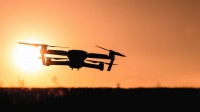FAA Greenlights First Automated Commercial Drone Service
January 20, 2021
The Federal Aviation Administration (FAA) has approved the first fully automated commercial drone flights, giving permission to Marlborough, Massachusetts-based American Robotics. The FAA’s decision limits automated drone operation to rural areas and altitudes below 400 feet. In Israel this June, Pizza Hut will test delivering pies via drones to makeshift “government-approved landing zones,” such as parking lots. From there, delivery drivers will take the pizzas the last mile to customers’ homes.
The Wall Street Journal reports that the FAA decision “represents broader effort to authorize widespread flights by shifting away from case-by-case exemptions for specific vehicles performing specific tasks.” Previously, the FAA allowed drones “to inspect railroad tracks, pipelines and some industrial sites beyond the sight of pilots or spotters on the ground as long as such individuals were located relatively close by.”

According to Commercial Drone Alliance executive director and attorney Lisa Ellman, at Hogan Lovells, the law firm that represents the company, the FAA granted permission to “fly in U.S. airspace without anyone controlling or monitoring it on site.”
American Robotics’ co-founder and CEO Reese Mozer said that, “the company worked with clients, mostly in the agriculture sector, to test its automated system.” In one growing season, “the drones flew as many as 10 autonomous flights a day to capture imagery and other data for farmers and researchers to accurately track crop growth.”
Its drones “weigh less than 20 pounds and have four propellers, landing vertically like helicopters” and will be used for agricultural operations in Kansas, Massachusetts and Nevada. WSJ says that, “by authorizing the company’s fully automated imaging drones to routinely fly in designated zones with remote control and monitoring, the agency opened the door to a range of additional uses that eventually could include other drone models, with higher and longer flights over more-populated areas.”
Still, some companies wanting to use drones for inspection and surveillance are hung up on FAA’s regulations on “how automated drones can avoid hitting other aerial vehicles.”
Elsewhere, WSJ reports on Pizza Hut Israel’s upcoming drone tests. At Dragontail Systems, the tech firm coordinating the Pizza Hut drone trial, CEO and director Ido Levanon noted that, “drone delivery is a sexy thing to talk about, but it’s not realistic to think we’re going to see drones flying all over the sky dropping pizzas into everyone’s backyards anytime soon.”
In 2016, in New Zealand, a Domino’s Pizza franchisee flew a drone to deliver two pizzas in a couple’s backyard. Five years later, however, Domino’s “hasn’t integrated drones into its delivery network in New Zealand, or anywhere else.” At University of the West of England, senior research fellow Stephen Wright noted that, now that technical obstacles have been resolved, “we’re hitting the next level, which is regulatory issues,” many of them related to safety.
In Israel, “the Ministry of Transportation is only allowing Pizza Hut to test its drone technology from one restaurant and within a designated ‘air bubble’ measuring roughly 50 square miles in the north of the country,” making deliveries to “a very limited number of households.” The drones can also only carry 2.5 kilograms, roughly 5.5 pounds, “which is the equivalent of two pizzas and a bottle of Coke.”

No Comments Yet
You can be the first to comment!
Sorry, comments for this entry are closed at this time.